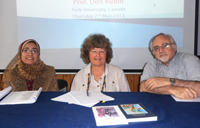At a time when Egypt is in the midst of political chaos, two York professors have set out to establish relations with the country’s second largest university, Ain Shams University in Cairo.
Theatre Professor Don Rubin and English/creative writing Professor Patricia Keeney have just returned from a joint teaching engagement at Ain Shams, which boasts not one, but four departments of English. This visit – the third time in Egypt for the married couple – constituted  the prelude to a hoped-for long-term exchange between York and Ain Shams.
the prelude to a hoped-for long-term exchange between York and Ain Shams.
From left, Nagwa Younis, director of the Centre for Developing English Language Teaching at Ain Shams University, Patricia Keeney and Don Rubin
A high level delegation of vice-presidents, deans and professors from Ain Shams visited York last November and met with a range of deans, officials from York International and President & Vice-Chancellor Mamdouh Shoukri to begin discussions regarding, among other possibilities, the establishment of a Canadian Studies program at Ain Shams and an Arabic Studies program at York University, including student and faculty exchanges in a variety of areas. Also discussed was a distance learning program in which Faculty at both institutions could offer courses electronically without having to leave their own campuses.
At Ain Shams, just prior to the beginning of the recent civil unrest, Rubin and Keeney gave lectures on Canadian theatre, Canadian fiction and poetry, women’s issues and critical theory. Keeney also gave readings from some of her 10 volumes of poetry and together they offered a dramatized series of dialogues on culture from Keeney’s recently published You Bring Me Wings (Antares Publishing House of Spanish Culture, York University).
How were they received?
“So many academics have declined or even cancelled visits to Egypt in the last couple of years,” said Rubin. “The universities there are frustrated by the general situation. Our actually showing up on their campus was taken as a statement of faith in the university and the country’s future. The lectures were supposed to be for 25 to 50 upper level and graduate students, but when news of foreign visitors being  there got around, the lecture rooms quickly filled to capacity, often well over 100 students with more than two-thirds being women.”
there got around, the lecture rooms quickly filled to capacity, often well over 100 students with more than two-thirds being women.”
Patricia Keeney
Keeney pointed out that “the situation for women is changing rapidly. What one sees publicly – partially or totally covered women, for instance – is not always a reflection of religious thinking, especially among the young. It is more political and social than anything else. This became clear in the questions I was getting after my talks on Euro-American Women’s Writing and changing notions of feminism. Inside and outside the lecture halls, conversation was frank and open, the discussions passionate. And there were quite a few young men in attendance, eager to understand and deal with changing ideas. These students were really hungry for what we could offer.”
Where will the exchange go from here?
“Several faculty members have expressed real interest in being part of this connection to Egypt and the Middle East,” said Rubin. “Of course everyone is concerned about the politics at the moment.” Keeney and Rubin agree that the country is deeply divided and that the current unrest has put the exchange plans in a state of suspended animation.
“The easiest possible way of connecting at this point,” continues Keeney “is through distance learning. If we at York can put together a course for Ain Shams on, say, Canadian literature with live video or computer access that would be a solid beginning. The technology certainly exists and so too does the interest. Ain Shams in its turn could mount a course on, say, Arabic contemporary poetry or drama similarly for us. The costs on both sides would be modest. It can happen. Even now.”
Funding already exists on the Egyptian side to send students to Canada and some individual Ain Shams students have already been at York under the Channel Scholarship Program.
Did they see the chaos coming when they were there?
They both agree that something had to break. “A third of the country was for the government, another third against it and another third baffled by it all,” says Rubin. “The pressure was growing daily. Politics was on everyone’s mind.” Although it will take time to pick up the pieces, Keeney and Rubin believe they will be picked up. Egypt is too important a country to both the region and the world.


